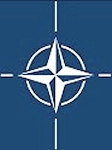2006年VOA标准英语-Russia Views Upcoming NATO Summit In Riga With(在线收听)
By Anya Ardayeva
Moscow
27 November 2006
watch NATO Summit report
The first NATO summit to be held on the territory of the former Soviet Union is scheduled to begin in Riga, Latvia, on November 28th. A number of issues are expected to be on the agenda, including deployment of forces in Afghanistan, nuclear nonproliferation, NATO enlargement and energy security. And as Anya Ardayeva reports from Moscow, Russia is likely to keep close watch on the upcoming meeting.
---
 |
| The NATO logo |
Following the decision to accept the Baltic States into NATO in 2004, Russia's once close ally Ukraine has also expressed its intention to join. The Kremlin was also irritated by NATO’s recent decision to launch a so-called intensive dialogue with Georgia, whose president, Mikhail Saakashvili, has pledged to take his country into the alliance in 2008. However, analysts say no firm decision on Georgia's accession is expected.
Pavel Felgenhauer, an independent Moscow-based military analyst, says the better NATO's relations are with the former Soviet republics, the worse its relations with Russia are likely to get.
"For many countries that are close to Russia, like the Baltic States, Poland, Moldova, potential members such as Ukraine and Georgia, as well as for many politicians in the countries of NATO, NATO is a guarantee that these countries will not be in Russia's sphere of influence,” says Felgenhauer. “That's why Russia and NATO are enemies and are not able to have good relations, the best thing they have is this cold co-operation to each other."
There are also concerns about Europe's growing dependence on Russian energy resources. The Russian state gas monopoly, Gazprom, currently supplies nearly a quarter of Europe's gas needs.
Evgeni Volk is the head of Moscow's office of The Heritage Foundation. He says the problem of energy security will be on the summit's agenda. "This problem is also part of NATO's authority. The countries of the Northern Alliance of course would like to diversify the sources of energy in order to depend on Russia less. This is a very complicated factor, especially in the light of growing prices on energy."
Recently, Russia has appeared to use its dominant role as an energy supplier to put pressure on states like Ukraine and Georgia by threatening to cut off supplies -- or actually cutting them off. It claims the moves were the result of price disputes, but observers say the real reason was the Russian displeasure at the so-called "color revolutions" in its former Soviet neighbors which led to pro-Western governments.
And it is not only pro-Western governments that are viewed as a threat to Russian interests these days. On the eve of the NATO summit in Riga, several Russian politicians have once again voiced their concerns about the "aggressive nature of the alliance" and measures that Russia should take to neutralize the perceived "threats" posed by its enlargement.
Analysts say the upcoming summit will be watched closely in the Kremlin because it is likely to define the tone of the relations between Russia and NATO for the near future.